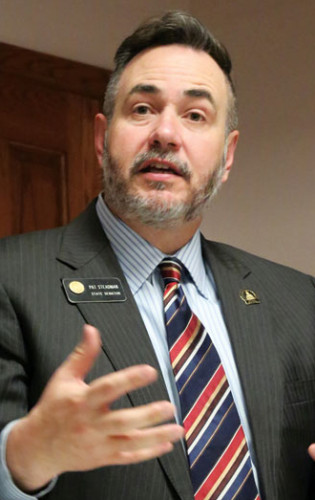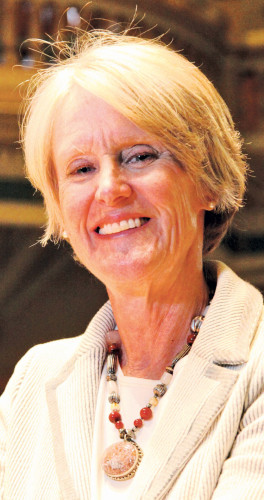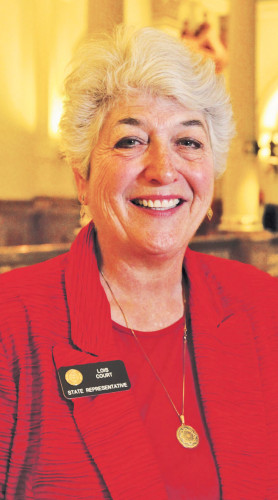The Front Porch looked back on conversations with our legislators at the beginning of the 2015 session (printed in our February issue) and found they were all successful in passing a number of bills they had identified as high priority for this session.![]()
TABOR

State Senator Pat Steadman (D) represents District 31, which includes Montclair, Mayfair, Hale and Lowry.
As the state’s tax base grows, refunds under the Taxpayer Bill of Rights (TABOR) will be impacting the state’s budget more and more in the future.
Proposition BB will be on the ballot this fall to let voters reaffirm their original intent to tax marijuana sales, let the state keep the revenue, and put $40 million toward school construction. A little known clause in TABOR exempted revenue from the first fiscal year of marijuana sales, so voters will have to vote yes again to carry out their original intent. Sen. Pat Steadman, who sponsored this bill, called his efforts to get Proposition BB on the ballot “truly one of the most complex things I’ve undertaken.”
Reps. McCann and Court proposed a bill to have a line item on state tax returns allowing people to voluntarily give back TABOR refunds to the state, but that bill did not pass.
JUSTICE
Rep. Angela Williams told the Front Porch in January that racial disparity issues in policing were a high priority for her this session. A total of six bills were passed as a “Rebuilding Trust” package of legislation; four were sponsored or co-sponsored by Williams:
Law Enforcement Use of Body-worn Cameras provides funding to increase the number of Colorado officers wearing body cameras.

State Representative Angela Williams (D) represents District 7, which includes all but two Stapleton precincts and Park Hill from Quebec to Monaco (south to Montview).
Disclose Misrepresentations by Police Officers prevents police officers from hiding unfavorable entries in their personnel files simply by joining a different police force.
Police Shooting Data Collection collects more data on officer-involved shootings.
Police Officer Training Improvements adds four civilians to the certification board for Colorado law enforcement agencies and requires it to take steps to promote diversity in police recruiting and to include anti-bias, community policing and de-escalation courses in police officers’ regular in-service training.
Sen. Mike Johnston, who talked in January about the lack of data on racial profiling, successfully sponsored the Police Data Collection and Community Policing (CLEAR) Act that requires the Department of Criminal Justice to compile and report data on the demographic breakdown of stops, arrests, charging, sentencing, parole hearing, and parole outcomes, with emphasis placed on determining if there is any racial or gender bias that exists in our policing system.

State Rep. Beth McCann (D) represents District 8, which includes all of Park Hill from Locust to Colorado Blvd., Hale, East Colfax, and two precincts in Stapleton just north of Montview and east of Central Park Blvd.
Johnston and McCann successfully sponsored the Felony Offense for Repeat DUI Offenders bill. They pointed out in our January conversation that Colorado was one of only five states that didn’t have a higher penalty after multiple DUIs. The new bill requires interventions for prior offenses and makes the fourth DUI conviction a class 4 felony.
McCann successfully sponsored the Juvenile Petty Offense Contracts bill. Under certain conditions, minors over 10 can now be offered a petty offense contract that spells out behaviors such as restitution, community service, school attendance, or restorative justice practices. Successful completion of the contract would keep these juveniles out of the justice system.
Steadman added in his report that bills to repeal legislation on background checks for gun purchases did not pass.
SOCIAL PROGRAMS

State Senator Mike Johnston (D) represents District 33, which includes Stapleton and Park Hill.
Johnston, in January, described his goal to pass a Pay for Success bill that would allow local governments and nonprofit providers to enter into contracts that would only obligate the state to pay for services if the contractor delivered on the outcome. Johnston’s successful bill requires a contractor to raise the capital for the project, and if the project works and saves the state money, the state will pay the contractor back with the savings. If the project does not work and does not save the state money, the contractor will not be reimbursed.
A bill to offer more protection to children in foster care was passed by McCann. If foster children are missing, the bill requires that they be reported to the National Center for Missing and Exploited Children and to local law enforcement no later than 24 hours after the disappearance is noted. McCann’s experience has shown that this population is particularly vulnerable to human trafficking.
In her end-of-session report, McCann notes that a privately funded program that brought a 40 percent reduction in teen pregnancies and a 30 percent reduction in abortions passed the House, but failed in the Senate—so that successful program will unfortunately end due to lack of funding.
GOVERNANCE & BUDGET

State Rep. Lois Court (D) represents District 6, which includes all of Lowry, E. Montclair, Montclair and Mayfair.
State Rep. Lois Court (D) represents District 6, which includes all of Lowry, E. Montclair, Montclair and Mayfair.
Rep. Court, successfully passed Improving the Statewide Initiative Process, a bill that ensures voters will have a clear understanding of the fiscal impact of proposed measures. It requires that the fiscal impact of a ballot initiative, prepared by nonpartisan staff, be both in the Blue Book for voters and also on the first page of petitions voters are asked to sign.
Steadman, as a member of the Joint Budget Committee, worked on the daunting task of creating a balanced budget for the state. At the end of five months of work, the budget passed with strong bipartisan support (31 to 2 in the Senate).
EDUCATION
According to Steadman’s session-end report, $60 million was invested in a new funding allocation model for colleges and universities; $20 million went to scholarships and financial aid; and $25 million went toward prior cuts in “the negative factor.” School funding consists of a base, per pupil amount, plus “factors” that make funding more equitable depending on the needs of individual districts. During the recession, the legislature defined these “factors” as not subject to the Amendment 23 school funding requirement, and funding for the “factors” was reduced dramatically. Steadman says the education funding shortfall due to these “negative factor” cuts is estimated to be $855 million.
Court sponsored bills that adjust the DPS contribution to pension plans (as suggested by the PERA board) that will enable DPS to put about $20 million more per year in classrooms.
On the controversial subject of testing, McCann’s end-of-session report states time will be reduced in most grades but remain the same for the transitional grades 5, 6, 8 and 9.
WORKFORCE TRAINING
Williams in January talked about the need to provide unemployed workers the opportunity to develop new skills. Her successful bill, Skilled Worker Outreach, Recruitment, Training, offers grants to providers that offer credentialed training programs to give workers new skills in industries that have a high demand for qualified workers.



0 Comments